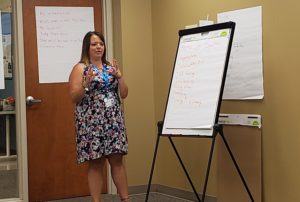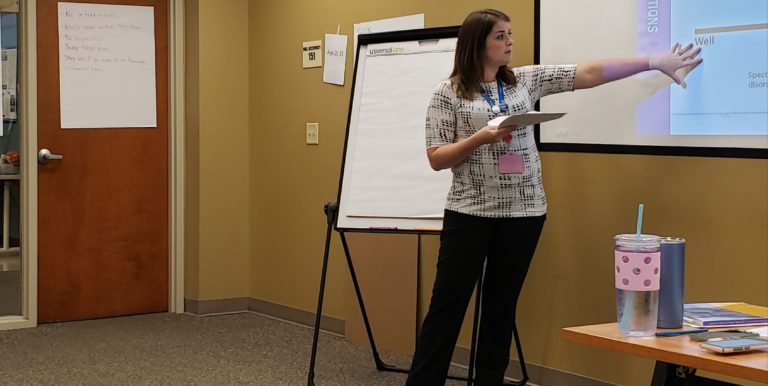We were discussing non-suicidal self-injury. Instructor Christina Ladd asked the group of 10 people who attended the Mental Health First Aid training a question.
“Why would someone injure themselves with no intent to kill?”
Being eager to participate (and genuinely curious), I raised my hand. I thought I had an answer.
“To get attention,” I said.
Ladd started to say something, then hesitated. Uh oh. Did I say the wrong thing?
“Why would they want attention?” she replied.
“As a cry for help,” I said.
She affirmed that was one of several reasons someone would injure themselves without trying to kill. From there, she and other trainees listed other possible reasons.
This sort of back-and-forth discussion took place throughout the eight-hour training.
Want to take Mental Health First Aid? Watch our Events page for upcoming scheduled trainings.
What is Mental Health First Aid?
Mental Health First Aid is the help offered to a person who’s experiencing a mental health challenge, mental disorder or mental health crisis. You give the first aid until the person receives the appropriate help or the crisis resolves.
MHFA teaches how to identify, understand and respond to signs of mental illness and substance use disorders. According to Mental Health First Aid, which provides the course materials, “The training gives you the skills you need to reach out and provide initial help and support to someone who may be developing a mental health or substance use problem or experiencing a crisis.”
“Mental health is just as important, and maybe less apparent to people who haven’t had training in this area,” said John Pavlack, comparing MHFA to traditional first aid. He’s a specialist trainer at A&C who occasionally instructs the Mental Health First Aid courses.
“You can see a broken bone,” he said. “You can see a cut or a scrape. Getting this training out to everyone helps us to create that safety net for people. It’s about recognition, it’s about connecting people to appropriate resources, and it doesn’t require you to be a professional mental health practitioner.”
Learn more about Adult & Child’s behavioral health treatment options.

Who should take Mental Health First Aid?
A&C offers traditional Mental Health First Aid training, which is geared more toward adults who are experiencing mental illness, but it also offers youth-specific MHFA training. I took the youth course.
“I would recommend this training to anybody in the community who interacts with youth on a regular basis,” Ladd said, referring to YMHFA. “If you’re in a faith-based organization, if you’re involved organized sports or camps, a teacher, a friend, a parent … basically anyone who has a young person in their life who they care about (should take the training).”
The class I attended included some A&C School-Based employees, but also parents, nurses and other community members.
“Mental Health First Aid is not going to teach you how to become a therapist or prescribe medication,” Ladd said. “You don’t have to have a formal background in psychology or counseling to be a mental health first-aider. All you really need is a passion to help people and save lives.”
Pavlack recommended the adult MHFA course to anyone who works with adults in any kind of capacity such as criminal justice, education or in a university setting.
Why is Mental Health First Aid training important?
Instructors shared some statistics about mental illness during the course. Among them:
- Only 41% of those with mental health issues will use services to treat those issues in a year.
- Those with mental health issues won’t be formally diagnosed until 10 years after their symptoms appear.
- Half of all lifetime mental illness cases begin by age 14; three-fourths begin by age 24.
- Mental health disorders affect about 18% of the U.S. population ages 18 to 54 during a given year, and about half of the population will have a diagnosis in their lifetime.
“We can have early intervention so (people) can get services faster and decrease the seriousness of the symptoms they’re experiencing,” Ladd said. “This training can help them save a life. There’s no set time that someone has a crisis.”
A person who’s experiencing a mental health episode might only feel comfortable sharing that information with one person, Ladd said. That person likely will be somone who’s taken Mental Health First Aid.
At Adult & Child, all of our support staff are required to take the training. A&C also recommends the training for people who have a bachelor’s degree or high school diploma and aren’t in the psychology field.
“I can guarantee that you’ll walk out of an eight-hour session with skills you didn’t have before, and a confidence you didn’t have coming in,” Pavlack said.
RELATED CONTENT: How Our LGBTQ Taskforce is Making our Agency and Community More Inclusive
People you know endorse it
From Lady Gaga to Michelle Obama to former NFL player Brandon Marshall, plenty of celebrities have either taken the Mental Health First Aid course or extol its virtues.
We’re thrilled to announce that @ladygaga‘s @BTWFoundation has helped train 150,000 people in Mental Health First Aid in partnership with @NationalCouncil. ???#BeTheDifference https://t.co/2M9npgnga9 pic.twitter.com/PIFVLnp3pi
— MentalHealthFirstAid (@MHFirstAidUSA) December 20, 2017
Course essentials
The course costs can vary, depending on which agency is hosting them, but Adult & Child is charging $25 for its two upcoming courses. MHFA’s website says the course is a $175 value. A&C only charges for the 200-page training manual that all trainees receive.
It’s typically an eight-hour course, and the host usually provides all materials (site, instructors, pens/paper, manual, etc.) Upon successfully completing the course, trainees will receive an emailed certificate.
Unlike traditional first aid, trainees only need to take MHFA training once. MHFA recommends that trainees become re-certified if they took the course more than three years ago, though. This enables trainees to stay up-to-date on the latest mental health and substance use disorder information. It costs $29.95 to take the online re-certification course.
RELATED CONTENT: Garfield Park Primary Care Clinic Continues Tradition on Indy’s Southside
What I learned
I’m not an instructor or someone who deals with youth daily, so I could take the youth course with more of an emotional detachment than others. Instructors occasionally warned that some of the examples they offered during the course might trigger an emotional reaction for anyone who’s experienced anything similar with one of their children or students.
Throughout the course, the instructors would describe normal youth behaviors. Insubordination, emotion after breaking up with a boyfriend/girlfriend, losing interest in certain activities and spending less time with family are all common teen behaviors, they said.
This course taught me how to know when those behaviors are normal teen traits, and when a mental health problem might be developing.
Even those who work in the mental health field have said they learned something valuable after taking the training.
“I went into it with a little bit of an attitude of, ‘What am I going to learn that I don’t know?’ Pavlack said. “The model that we teach is incredibly concise, incredibly effective and a really good way to organize how you respond as a first-aider in that situation. Much like CPR, there’s a really structured set of events.”
Want to learn more about Mental Health First Aid? Visit their website.
ABOUT THE AUTHOR: Adam Wire is Adult & Child Health’s marketing and communications specialist. He took the Youth Mental Health First Aid course to develop a better understanding of MHFA and its importance.






